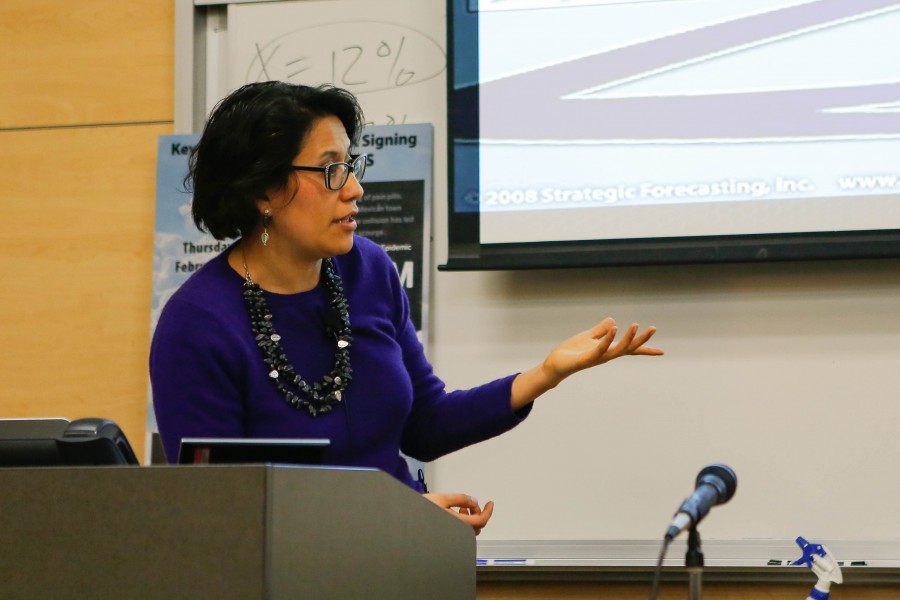Colloquium on Mexico
February 18, 2016
Drug trafficking. Migration. Corruption. These are some of the topics the two-day EWU Colloquium on Mexico focused on.
The colloquium was the first of its kind as an in-depth country analysis at Eastern that took the form of a conference Feb. 10 and 11. Joseph Lenti, Ph.D and one of the chairs of the event, said the goal of holding the event was “to make issues in Mexico much more salient, much more important in the opinions of peoples on campus and in the community.” Lenti is an assistant Latin American history professor at EWU.
Consisting of seven panel events with topics ranging from women’s rights in Mexico to the trafficking of drugs across the border for U.S. enjoyment, Eagle Entertainment and the Colleges of Social and Behavioral Science presented the EWU Colloquium on Mexico seeking to inform students and create a dialogue on the pressing issues that affect contemporary Mexico.
Lenti said the event was also organized to grant an understanding to students that Mexico is a political, cultural and economic partner with the United States. “I would like students to leave [the colloquium] knowing that Mexico’s destiny is linked to ours, they are intertwined,” said Lenti. “We have so many personal connections to Mexico. We have students on campus, hispanic students who have connections to Mexico. If the nation descends into chaos, its something that we too will feel.”
Many of the issues that headlined the panels and discussions focused around emigration, the corruption of Mexicos state government due to drug cartels infiltrating local governments and police impunity. However, one all-women panel, Women’s Activism in Mexico: Transnational Protest and Resistance, focused more on the United States’ involvement in plummeting conditions in Mexico due to trading and product demands.
EWU student Jana Gibson attended the panel and said it was interesting. “As an American consumer, I didn’t know that you are indirectly a part of exploiting Mexican women who are factory workers,” Gibson said.
The trade and low-wage labor factories near the U.S.-Mexico border are called maquiladoras. Conditions the women working are subjected to inside the maquiladoras is something Gibson said also struck her in the panel. “Pregnancy gets in the way of labor. The head bosses basically sterilize the women, put them on birth-control and ramp them up on drugs,” said Gibson. “They’re not even people.”
Not only was the event a forum for students to listen and learn, it was also a place to share ideas and become involved in the conversation.
Tobias Revand, EWU student, attended three events on Wednesday night. He said he attended to “gain more understanding of what is going on in the Mexico region.” Despite initially going for extra credit, Revand said he ended up learning a lot about the struggles in Mexico, particularly about the ongoings in Acapulco, Guerrero.
“One thing that really struck me was the situation in Acapulco and its surrounding areas,” said Revand. “It is basically like a medieval system where [residents] promise their political alliance to area leaders, and [the leaders] would give you protection, which you wouldn’t have otherwise.”
One of the roundtable discussions, Ayotzinapa in Context: Social Violence and Police Impunity, highlighted specifically the deaths of 43 Ayotzinapa student-teachers who were killed in 2014 by a local crime syndicate. The open discussion was lead by History and Chicano Studies professor Nydia Martinez who gave a brief introduction into the repressive nature of the Mexican government in opposition of political protests.
According to Revand, the roundtable discussion was a platform where students and faculty vocally engaged in the conversations. “I do feel like the conference was starting a conversation with the people, and that’s what I liked about it,” said Revand. “People were interacting, people were talking to [the panelists], people were involved, which was nice. That’s what I liked about the roundtable discussions.”
Revand said in retrospect he feels like the colloquium achieved its overall goal of creating awareness about Mexico within Eastern’s community. “They’re doing a great job of bringing up the problems to people like myself who don’t know,” he said. “I feel like I know a lot more.”








